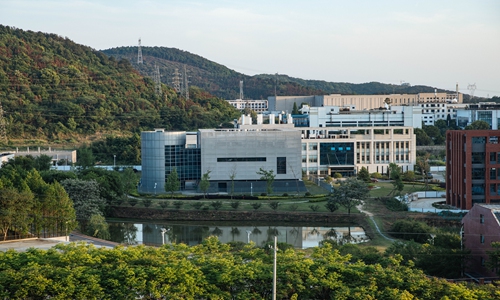China passes first biosafety law following COVID-19 epidemic, raises level to national security
By Wan Lin Source: Global Times Published: 2020/10/18 20:23:41

Wuhan Institute of Virology. Photo: Li Hao/GT
China approved its first law dedicated to biosafety, a move analysts said showed a determination to strengthen biosafety management, given controversy regarding biological labs' management and problems of distribution of the power and responsibility for different government authorities revealed during the COVID-19 epidemic.
The Biosafety Law was passed at a session of the Standing Committee of the 13th National People's Congress (NPC) on Saturday and will take effect on April 15, 2021.
Under the new law, the country will establish 11 basic systems for biosafety risk prevention and control, including a risk monitoring and early warning system, an information sharing and release system, an emergency response system, and an investigation and traceability system.
The law clarifies the responsibilities of relevant local authorities at all levels in the building and improvement of the systems, with administrative penalties and fines to be imposed.
Specifically, medical institutes or their staff members who conceal, falsely inform, delay or omit the reports of infectious diseases, animal or plant epidemics, or clustered diseases of unknown causes, shall be given a warning and directors of the institutes shall be sanctioned and may have their practice certificates suspended for a certain period, according to the law.
Yuan Jie, an official of the Commission for Legislative Affairs of the NPC Standing Committee, noted that the law will play a fundamental, systematic and leading role in the field of biosafety and its enactment stipulates that it is an important part of national security in China.
The law aims to improve China's capacity for biosafety governance in preventing and controlling major risks in the field of biosafety, including outbreaks of infectious diseases involving animals and plants, and biosafety in microbiology laboratory settings, experts said.
It comes following controversies on biological labs' management in China and the problems of the distribution of power and responsibility for different government authorities revealed during the COVID-19 epidemic.
For example, the Wuhan Institute of Virology, which has Asia's highest-level biosafety lab, has been at the center of controversy with some questioning its possible links to the outbreak of COVID-19.
"The challenges that we have faced in ecology and human health and the pandemic that the whole world is still fighting against all acted as a high alert for us, that biosafety has to be raised to a position of national security and protected by the law," Li Zongsheng, a NPC deputy and lawyer who focuses on wildlife protection, told the Global Times on Sunday.
Clear legal provisions and penalty mechanisms in place will make a big difference in establishing biosafety governance in the country, as these will alert people to the serious consequences of endangering biosafety, which would help prevent a biosafety crisis, according to Li.
Li Ning, an academician from the Chinese Academy of Engineering, earned 10.17 million yuan ($1.46 million) by illegally selling lab animals and experimental milk, media reported in January.
Under the new law, a fine of up to 1 million yuan will be imposed for those who put used experimental animals on the market, and their illegal gains shall be confiscated.
China has been strengthening biosafety governance after the COVID-19 outbreak.
In September, the Ministry of Agriculture and Rural Affairs issued a document that ordered further strengthening of supervision for laboratory management to ensure the safety of production in animal husbandry, animal-derived food and public health.
In July, the Chinese Center for Disease Control and Prevention issued a guideline ordering authorities to beef up the supervision and inspection work for novel coronavirus experiment activities in laboratories around the nation.
Posted in: SOCIETY,CHINA FOCUS